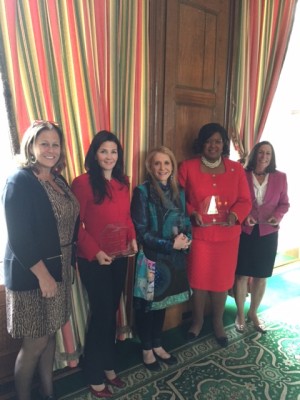At this year”™s “Driving Your Business: Women at the Wheel” event, panelists did not spend time touting their accolades, awards and boards on which they’ve sat. Rather, the four women on the panel talked about the journeys and adversity they faced before becoming leaders in their communities.
The panel consisted of Marissa Brett, president of the Westchester County Association; Belinda S. Miles, president of Westchester Community College; Marilynn Malerba, chief of the Mohegan tribe and Neale Godfrey, founder and CEO of the Children”™s Financial Network Inc.
Mary Paladino, a partner at Citrin Cooperman, moderated the event. Citrin Cooperman, which has offices in Norwalk and White Plains, sponsored the event, held at the Westchester Country Club in Harrison.
Miles was the first to speak, sharing stories of her upbringing in Queens by hardworking parents who never went to college but helped provide the necessary tools and environment for her and her siblings to earn degrees.
Miles said her father “knew college was a good thing. It was something other people did, in his experience, but he saw that people were able to have a different lifestyle and that”™s what he wanted for his family.”
She attended York College, City University of New York in Queens and commuted there via bus from home. It was there that Miles said she “was exposed to a world of knowledge, which was transformative.”
Academia would eventually become her career. Miles has worked in various roles for colleges including LaGuardia Community College, Nassau Community College, Columbia University and as provost at Cuyahoga Community College in Cleveland.
For the last nine months, Miles has been at the helm of Westchester Community College, overseeing a $400 million enterprise and more than 26,000 students in degree, certificate, non-credited and continuing education programs.

- From left: Mary Paladino, of Citrin Cooperman; Marissa Brett, of Westchester County Association; Neale Godfrey, of the Children”™s Financial Network Inc.; Belinda Miles, of Westchester Community College and Marilynn Malerba, of the Mohegan tribe.
A fellow Queens native, Brett spoke about her early ambitions of becoming a nail technician, but, “my mother had other plans,” she said.
Assuming she got good grades, Brett”™s mother agreed to pay for her two-year degree at the then Business Institute of Westchester, now the College of Westchester. Her mother agreed to pay for cosmetology school after that, but Brett never made it there. She was hooked by her experience at the Business Institute.
“As soon as I started, it”™s like I got stuck with the bug of learning to do well,” she said.
From there, she worked at the Stamford-based commercial real estate firm The Ashforth Company, where she moved up in the company after she pushed for a job as the assistant services administrator, a position that normally required more experience than she had.
“That was a pivotal moment for me because I said I”™m qualified for this job, I want this job and I pushed and I argued and I pushed and I argued and I got it,” she said. “So I think that”™s a really important moment because it means the persistence pays off.”
From there, Brett became vice president of the Hudson Valley Economic Development Corporation before taking over as president of the Westchester County Association.
Persistence was also a driver for Godfrey as she sought non-traditionally female positions in the ”˜70s and, as an author, wrote about what many publishing companies said were not topics of interest.
Godfrey joined Chase Manhattan Bank in 1972 ”“ one of two women in an executive training program ”“ and said she was told two things. First, don’t get pregnant. Second, she would make about half the salary of the men in the program.
“We didn”™t say anything in those days, you didn”™t; I was very happy to be there,” she said.
And for the next 13 years she rose through the ranks and helped broker what was in 1981 the largest merger in the United States, the $7.3 billion deal that made Conoco Inc. a subsidiary of Du Pont.
Godfrey next became the president of First Women Bank, which she reminded the audience was created in 1975, shortly after the Equal Credit Opportunity Act, which prevented creditors from discriminating against any applicant on the basis of, among other things, gender or race, passed.
Even so, she said she didn’t see the effects of the new law in her position with the bank.
“When I was at the First Women Bank, I watched women be disempowered handling their own money and that seemed ridiculous,” she said. “So I did research and found out it was because we were never taught anything about money as kids.”
When she realized there was a dearth books dedicated to teaching children how to handle money, Godfrey said she decided to fill that gap ”” a decision initially met with uninterested publishers until she said to herself, “You know how to do leverage buyouts, so I bought a publishing company.”
Since then, Godfrey has published 27 books and created the Children”™s Financial Network Inc., a company that helps to educate children and adults about financial literacy.
Malerba”™s experience growing up and starting a career could not have been more different than Godfrey”™s.
“Our tribe has been very egalitarian with men and women leading the tribe always,” she said, adding she is the second female chief to lead the Mohegan tribe, which settled in Connecticut and has been there for hundreds of years.
Malerba”™s career started when she became a nurse, which she said was a career path at the time for someone to get a practical education in three years and a job in the field after that.
“This was a very transformative experience for me,” she said. “You can”™t be shy when people who are completely naked are telling you their life story and the most intimate details of their lives and trusting you to take care of them.”
Malerba eventually became the director of cardiology and pulmonary services at Lawrence+Memorial Hospital. Around that time, she was also involved with the tribe, serving in various leadership positions including as a tribal council member and chairwoman of the federal committee for the Indian Health Service agency.
In 2010, Malerba became the 18th chief of the Mohegan Tribe.
“Being a nurse uniquely prepared me for being a leader because it teaches you to communicate in a way that resonates with people,” she said. “I”™m really fortunate people stood behind me and they believed in me and they followed my vision and there”™s no greater gift than that.”
An earlier version of this story stated Marissa Brett said she worked at the Food Bank for Westchester Inc. The job Brett was referred to was with The Ashforth Company.















